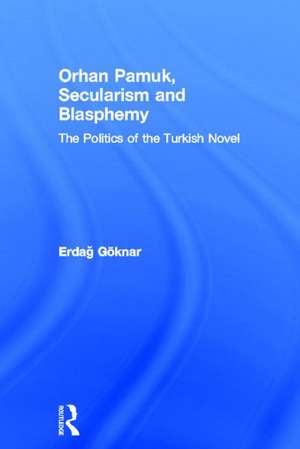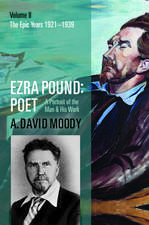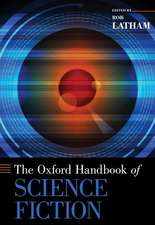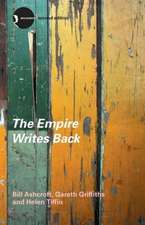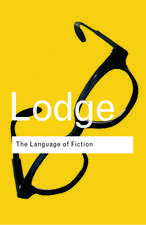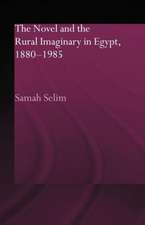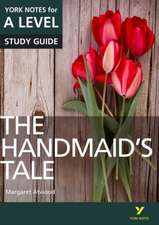Orhan Pamuk, Secularism and Blasphemy: The Politics of the Turkish Novel
Autor Erdag Göknaren Limba Engleză Hardback – 31 ian 2013
In 2005 Orhan Pamuk was charged with "insulting Turkishness" under Article 301 of the Turkish penal code. Eighteen months later he was awarded the Nobel Prize. After decades of criticism for wielding a depoliticized pen, Pamuk was cast as a dissident through his trial, an event that underscored his transformation from national literateur to global author. By contextualizing Pamuk’s fiction into the Turkish tradition and by defining the literary and political intersections of his work, Orhan Pamuk, Secularism and Blasphemy rereads Pamuk's dissidence as a factor of the form of his novels.
This is not a traditional study of literature, but a book that turns to literature to ask larger questions about recent transformations in Turkish history, identity, modernity, and collective memory. As a corrective to common misreadings of Pamuk’s work in its international reception, Orhan Pamuk, Secularism and Blasphemy applies various analytical lenses to the politics of the Turkish novel, including gender studies, cultural translation, historiography, and Islam. The book argues that modern literature that confronts representations of the nation-state, or devlet, with those of Ottoman, Islamic, and Sufi contexts, or din, constitute "secular blasphemies" that redefine the politics of the Turkish novel.
Concluding with a meditation on conditions of "untranslatability" in Turkish literature, this study provides a comprehensive and critical analysis of Pamuk’s novels to date.
| Toate formatele și edițiile | Preț | Express |
|---|---|---|
| Paperback (1) | 418.17 lei 6-8 săpt. | |
| Taylor & Francis – 31 ian 2013 | 418.17 lei 6-8 săpt. | |
| Hardback (1) | 1005.34 lei 6-8 săpt. | |
| Taylor & Francis – 31 ian 2013 | 1005.34 lei 6-8 săpt. |
Preț: 1005.34 lei
Preț vechi: 1226.03 lei
-18% Nou
Puncte Express: 1508
Preț estimativ în valută:
192.37€ • 201.26$ • 159.80£
192.37€ • 201.26$ • 159.80£
Carte tipărită la comandă
Livrare economică 02-16 aprilie
Preluare comenzi: 021 569.72.76
Specificații
ISBN-13: 9780415505376
ISBN-10: 0415505372
Pagini: 328
Dimensiuni: 156 x 234 x 23 mm
Greutate: 0.6 kg
Ediția:New.
Editura: Taylor & Francis
Colecția Routledge
Locul publicării:Oxford, United Kingdom
ISBN-10: 0415505372
Pagini: 328
Dimensiuni: 156 x 234 x 23 mm
Greutate: 0.6 kg
Ediția:New.
Editura: Taylor & Francis
Colecția Routledge
Locul publicării:Oxford, United Kingdom
Public țintă
Postgraduate and UndergraduateCuprins
Part I: Tropes of "Turkishness" from Islam to State 1. Literary Revisions of the Secular Modern 2. The Untranslated Novels of a Nobel Laureate Part II: The Archive of Ottoman Istanbul 3. A Voice from the Ottoman Archive 4. Reimagining the Ottoman Legacy Part III: The Literary Politics of the Secular-Sacred 5. Political Parody from Coups to Conspiracy 6. Novelizing Secular Sufism Conclusion The Blasphemies of 'turning Turk'
Recenzii
"In what sense is Orhan Pamuk, under fire by his government for "insulting Turkishness," Turkey's most representative national author in the literary world system? Orhan Pamuk, Secularism and Blasphemy addresses this conundrum, focusing on Pamuk's literary technique as a mode of political engagement that confounds antinomies between secular state (devlet) and politically enfranchised Islam (din), regionalism and cosmopolitanism, Kemalism and Turkism. Drawing on writings not yet accessible to Anglophone readers, as well as on the masterworks - The Black Book, My Name is Red, Snow - Erdag Göknar traces Pamuk's adventures in "postsecular" fictional form. Whether Pamuk is seen transforming the Empire-to-Republic Bildungsroman, fusing the novel with the Sufi tale, or depicting Istanbul as an archive in which Ottoman and Islamic memories are entered into disruptive, anachronistic relation with present modernities, he emerges as a remarkable fabulist of new literary cartographies.Göknar argues persuasively that Pamuk's writings have become a political flashpoint the world over because they are spellbindingly 'blasphemous' in truly unpredictable ways, which is to say, as volatile, translational spaces of the "secular-sacred." This lucidly written and comprehensive study of Pamuk's oeuvre is essential reading for all those interested in the politics of the novel, Turkish literary history, and the stakes of critical secularism in comparative literature today."
Emily Apter, New York University (author of The Translation Zone. A New Comparative Literature)
"Orhan Pamuk, Secularism and Blasphemy analyzes more than the Turkish Nobel laureate, more than the Turkish novel, and more than Turkish politics.It makes sense of the contradictory interactions among Pamuk, his writing, his homeland’s Ottoman past and present anxieties about the role of Islam in a secular state.Göknar helps us better understand Pamuk and Turkey by highlighting the politics of literary life in a globalizing age."
Walter Andrews, University of Washington (author of The Age of Beloveds: Love and the Beloved in Early Modern Ottoman Culture and Society)
"The greatest strength of Göknar’s study is the insight he provides into Pamuk’s position within the tradition of Turkish literary and cultural modernity. Göknar’s vast knowledge of Turkish literature and Ottoman culture provides a crucial context for reading Pamuk’s novels. To be sure, there are other paths to exploring Pamuk and his literary influences—his essays and memoirs are full of references to and reverence for European literature and modernity, so to ignore them would be a disservice to any scholarly reading. However, Göknar has provided a much needed corrective to those who seek to read Pamuk primarily from a Western perspective, as well as to those in Turkey who argue that he has betrayed his own literary and cultural heritage. As such, Orhan Pamuk, Secularism and Blasphemy should be required reading for anyone who wishes to understand one of contemporary literature’s most important voices."
David N. Coury, University of Wisconsin-Green Bay
CritCom, Council for European Studies
Emily Apter, New York University (author of The Translation Zone. A New Comparative Literature)
"Orhan Pamuk, Secularism and Blasphemy analyzes more than the Turkish Nobel laureate, more than the Turkish novel, and more than Turkish politics.It makes sense of the contradictory interactions among Pamuk, his writing, his homeland’s Ottoman past and present anxieties about the role of Islam in a secular state.Göknar helps us better understand Pamuk and Turkey by highlighting the politics of literary life in a globalizing age."
Walter Andrews, University of Washington (author of The Age of Beloveds: Love and the Beloved in Early Modern Ottoman Culture and Society)
"The greatest strength of Göknar’s study is the insight he provides into Pamuk’s position within the tradition of Turkish literary and cultural modernity. Göknar’s vast knowledge of Turkish literature and Ottoman culture provides a crucial context for reading Pamuk’s novels. To be sure, there are other paths to exploring Pamuk and his literary influences—his essays and memoirs are full of references to and reverence for European literature and modernity, so to ignore them would be a disservice to any scholarly reading. However, Göknar has provided a much needed corrective to those who seek to read Pamuk primarily from a Western perspective, as well as to those in Turkey who argue that he has betrayed his own literary and cultural heritage. As such, Orhan Pamuk, Secularism and Blasphemy should be required reading for anyone who wishes to understand one of contemporary literature’s most important voices."
David N. Coury, University of Wisconsin-Green Bay
CritCom, Council for European Studies
Descriere
This book examines the literary politics of Orhan Pamuk’s novels within the framework of contestations over “Turkishness,” Islam, and secularization. Moving beyond a traditional study of literature, this book turns to literature to ask larger questions about Turkish history, identity, collective memory, and cultural practice. It concludes with an interview with Orhan Pamuk.
